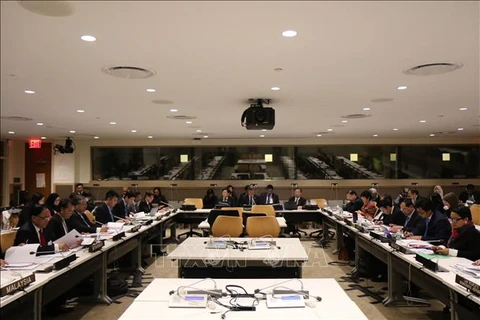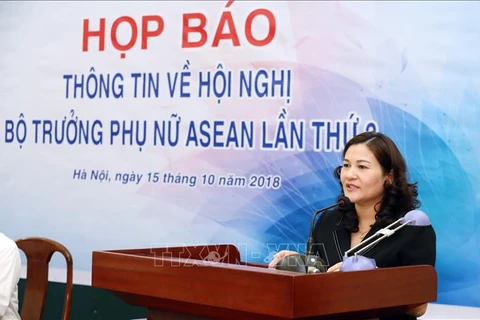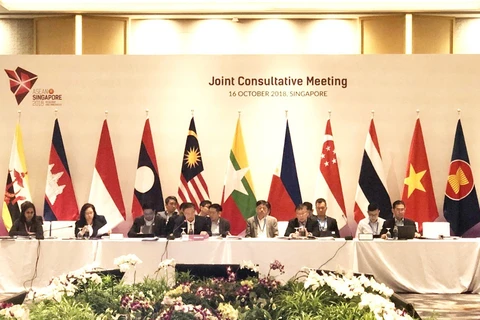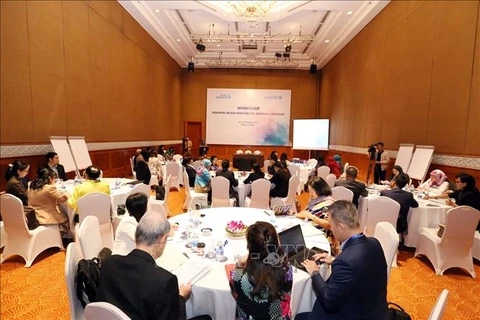Hanoi (VNA) – The 33rd ASEAN Summit, slated for November 13-15 in Singapore, will focus on strengthening intra-bloc cooperation and connections, building a resilient and innovative ASEAN Community and sketching out ASEAN orientations for following years.
Prime Minister Nguyen Xuan Phuc will lead a high-ranking delegation to Singapore to attend the event at the invitation of the host country’s Prime Minister Lee Hsien Loong.
Major events of the summit include the 33rd ASEAN Summit Meeting, the ASEAN Plus 3 (China, Japan, the Republic of Korea) Summit, the East Asia Summit, and seven ASEAN Plus 1 Summits with China, the Republic of Korea, Japan, the US, India, Australia and Russia.
The second high-level meeting will also be held for countries engaging in the Regional Comprehensive Economic Partnership (RCEP).
At the summits with partners, participants will discuss measures to foster collaboration among parties, including enhancing partnership in economy, trade, investment, infrastructure development, responding to changes in global economy, adapting to the Fourth Industrial Revolution, and settling global challenges such as environmental pollution and climate change.
The leaders will also discuss regional and international issues of mutual concern.
The ASEAN Community is based on three key pillars - ASEAN Political-Security Community (APSC), ASEAN Economic Community (AEC), and ASEAN Social-Cultural Community (ASCC). The grouping’s external relations as well as the target of narrowing down development gap among members have been integrated in the contents of all pillars.
The APSC aims to share common norms of conduct in the region, upholding intra-bloc solidarity and unity, promoting the value of tools and mechanisms to ensure regional security, and promoting common voice in regional and global challenges.
Through existing regional cooperation mechanisms, the APSC contributes to strengthen partnership, dialogue and trust building, reinforcing regional peace, security and stability.
Regarding the AEC, the ASEAN has continued efforts to supervise and evaluate the implementation of the AEC and promote measures for trade facilitation, including increasing intra-bloc trade and investment, developing high quality human resources as well as micro, small- and medium-sized enterprises.
At the same time, the ASEAN has fostered connections with partner economies through the adjustment and upgrading of existing free trade agreements and negotiating for new ones, while narrowing developing gaps among member countries.
The ASEAN Integration Initiative has been sped up, with 13 out of the 26 actions being implemented through 26 projects to enhance capacity and give technical support worth 9.9 million USD in Cambodia, Laos, Myanmar and Vietnam.
For the ASCC, the ASEAN has strengthened online supervision of the implementation of the ASCC Blueprint to prepare for the 2025 report. An ASCC special envoy will be sent to ASEAN mission in Jakarta in June 2020 to foster collaboration with other pillars.
Major cooperation objectives of the ASCC is to deal with issues related to the living conditions of people such as natural disaster and climate change response and supporting vulnerable groups. It also helps popularise the ASEAN Community among the people, enterprises and partners.
The ASEAN is to finish the third year of implementing the ASEAN Community Vision 2025 and blueprints for building the three pillars with positive results.
As many as 239 out of the 290 actions in political-security cooperation and 80 out of the 118 priorities in economic affiliations have been conducted, along with all the commitments in socio-cultural collaboration. Economic growth of the association is estimated to reach 5.1 percent in 2018 and 5.2 percent in 2019.
In 2018, upon Singapore’s proposal, the ASEAN has realized its priority in building a resilient and innovation ASEAN through various activities, including the issuance of the ASEAN Leaders’ Vision for a Resilient and Innovative ASEAN.
ASEAN external relations have been promoted, focusing on human resources training, digital economy, infrastructure development, anti-corruption, and cyber security.
So far, 91 countries have sent their ambassadors to the ASEAN, while 53 committees of the ASEAN have been set up in third countries.
ASEAN has pledged to continue promoting its central role in regional cooperation mechanisms that it has launched.-VNA
VNA
























